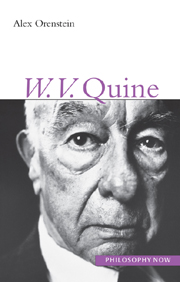6 - Analyticity and indeterminacy
Summary
In Chapter 5 we considered logical truths, and the claims that such sentences are analytic and grounded in language. There are other sentences that are also said to be analytic and non-empirical in their foundation, even though they are not logical truths in the precise Quinian sense of this term. Such sentences as
‘All bachelors are unmarried men.’
and
‘Nothing is taller than itself.’
are purportedly different in kind from factual, empirically justifiable sentences. Although they too are said to be true in virtue of the meanings of their terms, they are not strictly speaking logical truths. To see this, we need merely apply the definition of a logical truth, that is, truths which remain true whatever replacements we put in for their non-logical parts. If, in the first sentence, we replace the non-logical part ‘bachelor’ with ‘husband’, we obtain the false sentence ‘All husbands are unmarried men’. Similarly, in the second, when we replace the relational predicate ‘is taller than’ with ‘is as large as’, it yields the false sentence ‘Nothing is as large as itself’.
Quine's approach to all the sentences called ‘analytic’ is to separate the logical truths from the others. However, this separation is primarily for polemical purposes. While he holds that no analytic sentence, logical truth or otherwise is non-empirically justified (the mistake in thinking so stems from the dogma of reductionism: the non-holistic view that empirical evidence does not apply to some sentences), he subjects the non-logical analytic truths to a further criticism.
- Type
- Chapter
- Information
- W. V. Quine , pp. 119 - 148Publisher: Acumen PublishingPrint publication year: 2002



